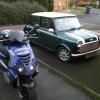The tie rod is removed and the wheel is back in position
I will investigate further thankyou

Posted 04 May 2014 - 05:38 PM
The tie rod is removed and the wheel is back in position
I will investigate further thankyou
Posted 04 May 2014 - 05:51 PM
Tie bar obviously bent - but also -
when a wheel is dropped back on to the ground (after being jacked up) it can appear to have a positive camber
until the car is rolled forward and suspension settles
Posted 04 May 2014 - 05:55 PM
Unfortunately this is not the case becausew i have had both wheels up in the air and allowed them to settle and the side which didnt take the shunt has no change in camber
Posted 04 May 2014 - 08:39 PM
so wonder if the subframe has moved around the lower arm area
although the subby is quite strong
could the lower arm bush shaft be bent inwards ? - would be the next weakest bit
Edited by sledgehammer, 04 May 2014 - 08:39 PM.
Posted 05 May 2014 - 10:54 AM
That could be a possibility based on how much the tie rod and steering arm bent
Thanks
Posted 05 May 2014 - 01:28 PM
Hope it's something cheap
fingers crossed
Posted 05 May 2014 - 02:07 PM
As with most engineering things, the answer lies in accurately measuring both sides to see where the difference is.
Lower arms don't bend, nor do top arms. The sub-frame can be kinked in one or more of several places, especially in the event of a hard impact. Steering arms bend, as do sub-frame tie-bar mountings (the 'ears' at the front - a common area for damage).
Measure accurately after establishing a centre-line datum and compare side-for-side.
Posted 05 May 2014 - 02:27 PM
I have had the same snag on my wifes mini (she did it in the ice and skidded into a kerb 'only doing about 1mph' apparently)
Any how i checked everything, arms tie bars even replaced the ball joints in case they had somehow flat spotted and eventually found it had snapped the subframe right at the back where the diff sits. I also replaced a front subframe on a friends car due to the same problem of the subframe splitting in this place. So it must be quite common. Worth checking!
Posted 06 May 2014 - 12:06 AM
Stevie, you have been unlucky, as subframes don't break there very often. It is most likely to be due to fatigue, rather than impact, and that would typically be a result of defective mounts or something similar, causing long-term flexing, as mild steel is normally quite a tolerant material, hence the name. But cracking can also start at notches, scratches, badly drilled bolt holes, etc, and it is the tip radius of the damage that matters (smaller is worst), so it is sometimes possible to identify damage that triggered off the fracture.
Mild steel is also quite ductile, and as already suggested, the subframe can be pushed inwards in the area of the lower arm mount by a side impact on the wheel, without breaking. The lower arm is somewhat over-engineered, and is extremely unlikely to bend, as the ball joint will almost always shear first.
As Cooperman suggests, you can only be sure by detailed measurements, not by any of us well-intentioned people idly speculating on a forum. But do look carefully for signs of distortion in the subframe, and it is indeed worth checking the pivot pin, and although I would predict that the subframe would distort first, it never does any harm to do a quick check of the cheapest and easiest to fix things first.
I don't see much hope of straightening a damaged subframe. The best thing would be to acquire a good used one. They don't usually rust seriously, thanks to engine oil leaks, so if you find a Mini that is being scrapped due to rust, the subframe may still be usable.
0 members, 1 guests, 0 anonymous users